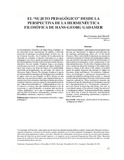El “sujeto pedagógico” desde la perspectiva de la hermenéutica filosófica de hans-georg gadamer

View/
Date
2015Author
Palabras Clave
Educación, Hermenéutica filosófica, Sujeto pedagógicoEducation, Philosophical hermeneutics, Pedagogical subject
Metadata
Show full item recordAbstract
La hermenéutica filosófica de Hans-Georg Gadamer se ha convertido en un “instrumento” de análisis y reflexión
acerca de la ontología, la epistemología, la ética, etc., de las Ciencias Sociales. En el ámbito de la educación un elemento en constante evolución conceptual es el sujeto pedagógico; por ello se puede preguntar por el rendimiento de la hermenéutica filosófica en la construcción del discurso educativo. En este sentido, Gadamer llega a sus propias conclusiones acerca de la ontología del sujeto después de hacer una crítica a las ideas del sujeto en la modernidad; cuestiona principalmente las nociones de sujeto de
Descartes, Kant y Husserl. No obstante, Gadamer se apoya en la hermenéutica ontológica de Heidegger para considerar
al sujeto como ser-en-el-mundo, es decir, inserto en una tradición, con una historicidad y una lingüisticidad que lo
caracterizan. Estos elementos ontológicos pueden proyectarse al ámbito educativo para presentar la conceptualización de
una “educación hermenéutica”, fundamentada no sólo en el conocer y el hacer, sino que también abarque el ser de la persona, y, específicamente, se propone una noción de
“sujeto pedagógico” en la que se argumenta a favor de que éste debe ser histórico, hermenéutico, racional, crítico, demandante, autónomo, corporal y sensible.
Collections
Información Adicional
| Otros Títulos | The “pedagogical subject” from Hans-Georg Hadamer’s philosophical hermeneutics perspective |
| Correo Electrónico | rizocarmona@yahoo.com.mx |
| ISSN | 0798-1570 / Electrónico: 22448438 |
| ISSN Electrónico | 22448438 |
| Resumen en otro Idioma | La hermenéutica filosófica de Hans-Georg Gadamer se Hans-Georg Gadamer’s philosophical hermeneutics has become an “instrument” of analysis and reflection on the ontology, epistemology, ethics, etc., of the Social Sciences. Since, in the field of education, an element in constant conceptual evolution is the pedagogical subject; one can therefore ask oneself about the performance of philosophical hermeneutics in the construction of the educational discourse. To this effect, Gadamer draws his own conclusions about the ontology of the subject after doing a critique of the ideas of the subject in modern times; he mainly discusses the notions of subject in Descartes, Kant and Husserl. Nevertheless, Gadamer relies on Heidegger’s ontological hermeneutics to consider the subject as a being-in-the-world, i.e., inserted within tradition and characterized by both historical and linguistic authenticity. These ontological elements can be projected into the educational environment to present the conceptualization of a “hermeneutic education”, not only based in knowing and doing, but also in covering the nature of the person’s being; the notion of a “pedagogical subject” is proposed specifically, arguing in its favor that it must be historical, hermeneutical, rational, critical, demanding, autonomous, corporal or bodily and sensitive. |
| Colación | 37-44 |
| Periodicidad | Semestral |
| País | Venezuela |
| Institución | Universidad de Los Andes |
| Publicación Electrónica | Revista Cifra Nueva |
| Sección | Revista Cifra Nueva: Artículos |





